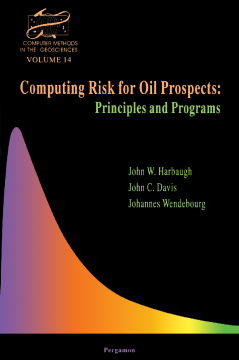
BOOK
Computing Risk for Oil Prospects: Principles and Programs
J.W. Harbaugh | J.C. Davis | J. Wendebourg
(1995)
Additional Information
Book Details
Abstract
The petroleum industry is enduring difficult financial times because of the continuing depressed price of crude oil on the world market. This has caused major corporate restructuring and reductions in staff throughout the industry. Because oil exploration must now be done with fewer people under more difficult economic constraints, it is essential that the most effective and efficient procedures be used. Computing Risk for Oil Prospects describes how prospect risk assessment — predicting the distribution of financial gains or losses that may result from the drilling of an exploration well — can be done using objective procedures implemented on personal computers. The procedures include analyses of historical data, interpretation of geological and geophysical data, and financial calculations to yield a spectrum of the possible consequences of decisions. All aspects of petroleum risk assessment are covered, from evaluating regional resources, through delineating an individual prospect, to calculation of the financial consequences of alternative decisions and their possible results. The bottom lines are given both in terms of the probable volumes of oil that may be discovered and the expected monetary returns. Statistical procedures are linked with computer mapping and interpretation algorithms, which feed their results directly into routines for financial analysis. The programs in the included library of computer programs are tailored to fit seamlessly together, and are designed for ease and simplicity of operation. The two diskettes supplied are IBM compatible. Full information on loading is given in Appendix A - Software Installation. Risk I diskette contains data files and executables and Risk 2 diskette contains only executables.
The authors contend that the explorationist who develops a prospect should be involved in every facet of its analysis, including risk and financial assessments. This book provides the tools necessary for these tasks.
Michael R. Walls
...an informative and well-written book...For the geologist, engineer or manager who knows about exploration geology but not about probability, economic analysis, and decision-making techniques, I highly recommend this book.
Geotimes
James A. Murtha
...I found this book a highly readable, carefully constructed, painstakingly systematic presentation of a viewpoint that may be shared by many...the book is a significant and long overdue addition to the petroleum literature. I would add Computing Risk for Oil Prospects to a short list of books worth owning and rereading. The price tag is justified by the inclusion of the software and the data.
Computers & Geosciences
